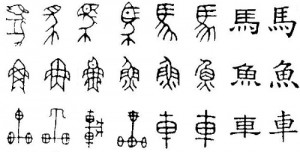Hi all,
Prompt: “At the end of this lesson you will find detailed instructions for this assignment. Your task is to take the story that Kings tells about how evil comes into the world — and change the story any way you want as long as the end remains the same: once you have told a story, you can never take it back. So, be careful of the stories you tell, AND the stories you listen to.” – Unit 1, Lesson 1.3
This week, we were responsible for taking Thomas King’s retelling of Leslie Silko’s story of how evil first came into the world. Silko’s story revolves around Witches, and I was inspired by this mythical aspect of her tale and decided to invent my own type of people, called the Dreamweavers. I chose to base my story on the ideas of dreams and nightmares because I think they are closely related to stories and are an area that reveal the ways stories can resonate with us on a level past our day to day consciousness.
Here it is:
This tale begins a long, long time ago, when the first humans and animals first came to be and there was no bad or evil in the world. Among all those roaming the land, there existed in particular, one small magical kind of people who inhabited an unknown island. These people were known as the Dreamweavers. Dreamweavers were those that were born with the gift to weave and create the dreams of every living being on earth. Each Dreamweaver family had their own unique and separate ability to weave different types of happy dreams, responsible for weaving the dreams that graced every child, teen, and adult in the world. One family was responsible for weaving dreams of hopes and wishes, one for weaving dreams of laughter, and many others for love, friendship, nurturing, and the list goes on and on. Now the children of these Dreamweavers were meant to grow up and take over the specific dream skills of their parents, like families of blacksmiths or farmers or merchants that passed on their skill and line of job to their children. Children of each dream weaving family would follow on to fulfill the types of dreams their parents and grandparents wove for many generations before them.
However, there was one mischievous and restless little girl from the land of the Dreamweavers that we must learn about. Her name was Jay, and her parents weaved dreams of candy and lollipops. Now Jay was only at fault in that she was too eager. She was tired of being young and unimportant and waiting her turn because she wanted to start dream weaving now. But Jay’s parents told her there were no other types of dreams left to weave, and she must wait until her parents passed on their type of dreams to her one day. Jay was fed up with being told she wasn’t ready yet, so she she called a meeting with some of friends and suggested they think up of their own dreams to weave. New and different dreams that hadn’t been thought of yet. They decided to tell some stories to inspire themselves of what kind of new dreams they could create. As the sun set, and the shadows of animals and plants and trees danced in the dimming sunlight, they were inspired by the darkness around them and thought of some of the most evil and dark stories that ever graced the earth. They thought up stories filled with blood and tainted with violence, greed and disease, lies, and fear.
As the last light of day disappeared over the horizon, Jay began to feel a really bad feeling, a feeling she had never felt before, as if she had been poisoned by the words she had spoken and heard. She nervously said, “Ok, I changed my mind, I feel bad, I don’t want to be the Dreamweavers of these new dreams we thought of. Let’s take back these stories, and go home. But it was too late. For once a story is told, it cannot be pulled back. These stories released these horrible dreams loose into the world, and they became what we today know as the nightmares that terrorize each and every one of us from time to time. So you have to be careful with the stories you tell.
The End.
After writing this story, I decided to attempt to tell it to both my parents and my boyfriend by heart. Although I hadn’t spent any time attempting to memorize what I had written, I was surprised by how easily I could remember the setting, details, character names, and various other details. It was a story I had made up, within a short period of time, and yet it had found its way so snugly into my mind and being. When my boyfriend asked me to clarify a detail about the main character, I answered quickly and confidently. In many ways, the story had become part of my identity, and I was attached to it.
I think this is indicative of the power of stories, and how they resonate with us and influence us in ways we may not even notice. It’s easy for us to assume we have the power in choosing the stories we tell and listen to, and thats true to a certain extent. But I think its worth mentioning that these stories have an equal, often overlooked power over us, and for this reason, they are an indispensable aspect of our lives.
Works Cited
Cherry, Kendra. “Dream Interpretation: What Do Dreams Mean?” About Education. N.p., 2015. Web. 24 May 2015. <http://psychology.about.com/od/statesofconsciousness/p/dream-interpret.htm>
Wilkerson, Richard. “Common Questions About Nightmares.” International Association for the Study of Dreams. N.p. 2013. Web. 25 May 2015. <http://www.asdreams.org/nightma.htm>


